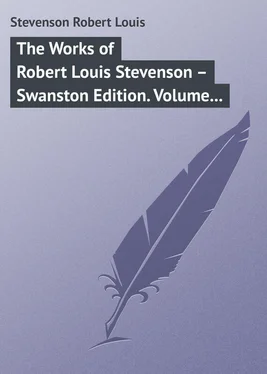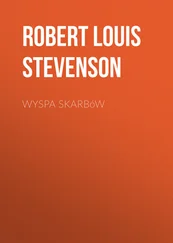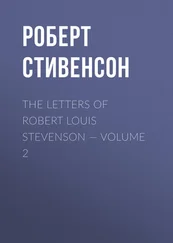Robert Stevenson - The Works of Robert Louis Stevenson – Swanston Edition. Volume 20
Здесь есть возможность читать онлайн «Robert Stevenson - The Works of Robert Louis Stevenson – Swanston Edition. Volume 20» — ознакомительный отрывок электронной книги совершенно бесплатно, а после прочтения отрывка купить полную версию. В некоторых случаях можно слушать аудио, скачать через торрент в формате fb2 и присутствует краткое содержание. Жанр: foreign_prose, на английском языке. Описание произведения, (предисловие) а так же отзывы посетителей доступны на портале библиотеки ЛибКат.
- Название:The Works of Robert Louis Stevenson – Swanston Edition. Volume 20
- Автор:
- Жанр:
- Год:неизвестен
- ISBN:нет данных
- Рейтинг книги:4 / 5. Голосов: 1
-
Избранное:Добавить в избранное
- Отзывы:
-
Ваша оценка:
- 80
- 1
- 2
- 3
- 4
- 5
The Works of Robert Louis Stevenson – Swanston Edition. Volume 20: краткое содержание, описание и аннотация
Предлагаем к чтению аннотацию, описание, краткое содержание или предисловие (зависит от того, что написал сам автор книги «The Works of Robert Louis Stevenson – Swanston Edition. Volume 20»). Если вы не нашли необходимую информацию о книге — напишите в комментариях, мы постараемся отыскать её.
The Works of Robert Louis Stevenson – Swanston Edition. Volume 20 — читать онлайн ознакомительный отрывок
Ниже представлен текст книги, разбитый по страницам. Система сохранения места последней прочитанной страницы, позволяет с удобством читать онлайн бесплатно книгу «The Works of Robert Louis Stevenson – Swanston Edition. Volume 20», без необходимости каждый раз заново искать на чём Вы остановились. Поставьте закладку, и сможете в любой момент перейти на страницу, на которой закончили чтение.
Интервал:
Закладка:
“So, ye’re for England, are ye?” said he.
I told him yes.
“Weel, there’s waur places, I believe,” was his reply; and he relapsed into a silence which was not broken during a quarter of an hour of steady walking.
This interval brought us to the foot of a bare green valley, which wound upwards and backwards among the hills. A little stream came down the midst and made a succession of clear pools, near by the lowest of which I was aware of a drove of shaggy cattle, and a man who seemed the very counterpart of Mr. Sim making a breakfast upon bread and cheese. This second drover (whose name proved to be Candlish) rose on our approach.
“Here’s a mannie that’s to gang through with us,” said Sim. “It was the auld wife Gilchrist wanted it.”
“Aweel, aweel,” said the other; and presently, remembering his manners, and looking on me with a solemn grin, “A fine day!” says he.
I agreed with him, and asked him how he did.
“Brawly,” was the reply; and without further civilities, the pair proceeded to get the cattle under way. This, as well as almost all the herding, was the work of a pair of comely and intelligent dogs, directed by Sim or Candlish in little more than monosyllables. Presently we were ascending the side of the mountain by a rude green track, whose presence I had not hitherto observed. A continual sound of munching and the crying of a great quantity of moor birds accompanied our progress, which the deliberate pace and perennial appetite of the cattle rendered wearisomely slow. In the midst my two conductors marched in a contented silence that I could not but admire. The more I looked at them, the more I was impressed by their absurd resemblance to each other. They were dressed in the same coarse home-spun, carried similar sticks, were equally begrimed about the nose with snuff, and each wound in an identical plaid of what is called the shepherd’s tartan. In a back view they might be described as indistinguishable; and even from the front they were much alike. An incredible coincidence of humours augmented the impression. Thrice and four times I attempted to pave the way for some exchange of thought, sentiment, or – at the least of it – human words. An Ay or a Nhm was the sole return, and the topic died on the hillside without echo. I can never deny that I was chagrined; and when, after a little more walking, Sim turned towards me and offered me a ram’s horn of snuff, with the question, “Do ye use it?” I answered, with some animation, “’Faith, sir, I would use pepper to introduce a little cordiality.” But even this sally failed to reach, or at least failed to soften, my companions.
At this rate we came to the summit of a ridge, and saw the track descend in front of us abruptly into a desert vale, about a league in length, and closed at the farther end by no less barren hill-tops. Upon this point of vantage Sim came to a halt, took off his hat, and mopped his brow.
“Weel,” he said, “here we’re at the top o’ Howden.”
“The top o’ Howden, sure eneuch,” said Candlish.
“Mr. St. Ivy, are ye dry?” said the first.
“Now, really,” said I, “is not this Satan reproving sin?”
“What ails ye, man?” said he. “I’m offerin’ ye a dram.”
“O, if it be anything to drink,” said I, “I am as dry as my neighbours.”
Whereupon Sim produced from the corner of his plaid a black bottle, and we all drank and pledged each other. I found these gentlemen followed upon such occasions an invariable etiquette, which you may be certain I made haste to imitate. Each wiped his mouth with the back of his left hand, held up the bottle in his right, remarked with emphasis, “Here’s to ye!” and swallowed as much of the spirit as his fancy prompted. This little ceremony, which was the nearest thing to manners I could perceive in either of my companions, was repeated at becoming intervals, generally after an ascent. Occasionally we shared a mouthful of ewe-milk cheese and an inglorious form of bread, which I understood (but am far from engaging my honour on the point) to be called “shearer’s bannock.” And that may be said to have concluded our whole active intercourse for the first day.
I had the more occasion to remark the extraordinarily desolate nature of that country, through which the drove-road continued, hour after hour, and even day after day, to wind. A continual succession of insignificant shaggy hills, divided by the course of ten thousand brooks, through which we had to wade, or by the side of which we encamped at night; infinite perspectives of heather; infinite quantities of moorfowl; here and there, by a stream-side, small and pretty clumps of willows or the silver birch; here and there, the ruins of ancient and inconsiderable fortresses – made the unchanging characters of the scene. Occasionally, but only in the distance, we could perceive the smoke of a small town or of an isolated farmhouse or cottage on the moors; more often, a flock of sheep and its attendant shepherd, or a rude field of agriculture perhaps not yet harvested. With these alleviations, we might almost be said to pass through an unbroken desert – sure, one of the most impoverished in Europe; and when I recalled to mind that we were yet but a few leagues from the chief city (where the law-courts sat every day with a press of business, soldiers garrisoned the Castle, and men of admitted parts were carrying on the practice of letters and the investigations of science), it gave me a singular view of that poor, barren, and yet illustrious country through which I travelled. Still more, perhaps, did it commend the wisdom of Miss Gilchrist in sending me with these uncouth companions and by this unfrequented path.
My itinerary is by no means clear to me; the names and distances I never clearly knew, and have now wholly forgotten; and this is the more to be regretted as there is no doubt that, in the course of those days, I must have passed and camped among sites which have been rendered illustrious by the pen of Walter Scott. Nay, more, I am of opinion that I was still more favoured by fortune, and have actually met and spoken with that inimitable author. Our encounter was of a tall, stoutish, elderly gentleman, a little grizzled, and of a rugged but cheerful and engaging countenance. He sat on a hill pony, wrapped in a plaid over his green coat, and was accompanied by a horsewoman, his daughter, a young lady of the most charming appearance. They overtook us on a stretch of heath, reined up as they came alongside, and accompanied us for perhaps a quarter of an hour before they galloped off again across the hillsides to our left. Great was my amazement to find the unconquerable Mr. Sim thaw immediately on the accost of this strange gentleman, who hailed him with a ready familiarity, proceeded at once to discuss with him the trade of droving and the prices of cattle, and did not disdain to take a pinch from the inevitable ram’s horn. Presently I was aware that the stranger’s eye was directed on myself; and there ensued a conversation, some of which I could not help overhearing at the time, and the rest have pieced together more or less plausibly from the report of Sim.
“Surely that must be an amateur drover ye have gotten there?” the gentleman seems to have asked.
Sim replied I was a young gentleman that had a reason of his own to travel privately.
“Well, well, ye must tell me nothing of that. I am in the law, you know, and tace is the Latin for a candle,” answered the gentleman. “But I hope it’s nothing bad.”
Sim told him it was no more than debt.
“O Lord, if that be all!” cried the gentleman; and turning to myself, “Well, sir,” he added, “I understand you are taking a tramp through our forest here for the pleasure of the thing?”
Читать дальшеИнтервал:
Закладка:
Похожие книги на «The Works of Robert Louis Stevenson – Swanston Edition. Volume 20»
Представляем Вашему вниманию похожие книги на «The Works of Robert Louis Stevenson – Swanston Edition. Volume 20» списком для выбора. Мы отобрали схожую по названию и смыслу литературу в надежде предоставить читателям больше вариантов отыскать новые, интересные, ещё непрочитанные произведения.
Обсуждение, отзывы о книге «The Works of Robert Louis Stevenson – Swanston Edition. Volume 20» и просто собственные мнения читателей. Оставьте ваши комментарии, напишите, что Вы думаете о произведении, его смысле или главных героях. Укажите что конкретно понравилось, а что нет, и почему Вы так считаете.










